Devotional 07 April 2025

As the bowls of God’s wrath are poured out in Revelation 16, the third targets the very source of life—water. What once was meant to refresh is now turned to blood. This judgment mirrors the third trumpet (Revelation 8:10–11), but here the message is intensified and personalized: those who have spilled the blood of God’s servants now receive blood to drink in return.
This judgment is not arbitrary. The angel over the waters—a representative of creation itself—proclaims God’s justice. The altar, where the prayers and cries of the martyrs reside (Revelation 6:9–10), echoes this declaration. All of heaven agrees: God’s judgment is righteous and deserved.
This moment highlights a profound truth: God is glorified not only in mercy, but also in justice. As Romans 9:22–23 reminds us, God’s wrath against “vessels of wrath prepared for destruction” magnifies the mercy shown to the “vessels of mercy.” His holiness is on display when evil is exposed and punished.
Those who reject the Living Water—Christ Himself (John 4:10; 7:38)—seeking satisfaction in the systems of the world, find only bitterness and death in return. Their rejection of truth leads not to freedom, but to judgment. Meanwhile, the people of God are reminded that the Word we proclaim is life to some and a testimony of judgment to others (2 Corinthians 2:15–16).
So, let us continue to boldly proclaim the gospel—not just as a call to salvation, but as a witness to God’s glory, both in mercy and in righteous judgment.